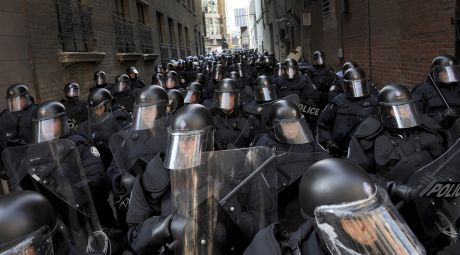What we think
You are here
Are we losing the fight for civil liberties in Canada

December 14, 2012
In the wake of 9/11, governments around the world, including Canada’s, passed harsh “anti-terror” legislation that attacked basic civil liberties and gave extraordinary powers to the police and the RCMP. Muslims, Arabs and other racialized groups have been disproportionately targeted, through practices such as racial profiling, security certificates and “no-fly” lists.
In the years since 9/11, many of these “temporary” measures have become permanent, and are increasingly deployed to clamp down on political opposition. The widespread repression in the lead-up to and during the G20 Summit in Toronto in June 2010 is the most notorious example: the Conservatives spent over $1 billion on “security” which resulted in the largest mass arrest in Canadian history—more than double the number detained during the War Measures Act in 1970.
These and other attacks have led some to suggest that Canada is becoming a police state, or that the Conservatives are fascist. But this argument ignores the long history of repression in Canada—of indigenous communities, people of colour, immigrants and refugees, and Quebec—and the repressive nature of “liberal democratic” states in general. It also ignores the fact that, despite increasing repression, it is still possible (and legal) to organize, mobilize and demonstrate openly.
Perhaps a better question is this: how can we most effectively mobilize to defend civil liberties? Although the last decade has seen set-backs, there have also been impressive push-backs—though not without extraordinary effort. For example, the legal fight against security certificates, supported by a high profile political campaign, has been long and difficult (especially for the detained men and their families), but it has stayed the hand of the state and so far prevented deportations. In response to cases like these, and the numerous protests that followed the G20 Summit, public opinion has shifted dramatically—a sign that civil liberties is a mainstream issue that a majority of people care about.
In recent months, the most successful mobilization to defend civil liberties was the Quebec student strike. As soon as Quebec premier Jean Charest introduced Bill 78 (later Law 12), which attempted to criminalize student strikes and demonstrations, the student movement shifted its focus from the demand to stop the tuition fee hike to the demand to defend civil liberties. The broader mobilization attracted even those who supported the fee hike, and made possible the single largest demonstration for civil liberties in Canadian history: up to 400,000 people marched on May 22 against Charest’s repressive law. Within months, the pressure of the mobilization created a social crisis, provoking an election that saw the Liberals defeated and Charest lose his seat. Also feeling the heat, the incoming government scrapped the law.
The Quebec student strike shows the most effective way to challenge repressive laws and practices: build broad, mass mobilizations that attract support from the widest possible segments of society, and that encourage their active participation in the movement—on whatever level they can. Even in the face of increasingly hostile governments, mass mobilization has the greatest potential to defy and defeat repressive legislation, and to demonstrate in practice the real expression of civil liberties.
Section:
- Log in to post comments









